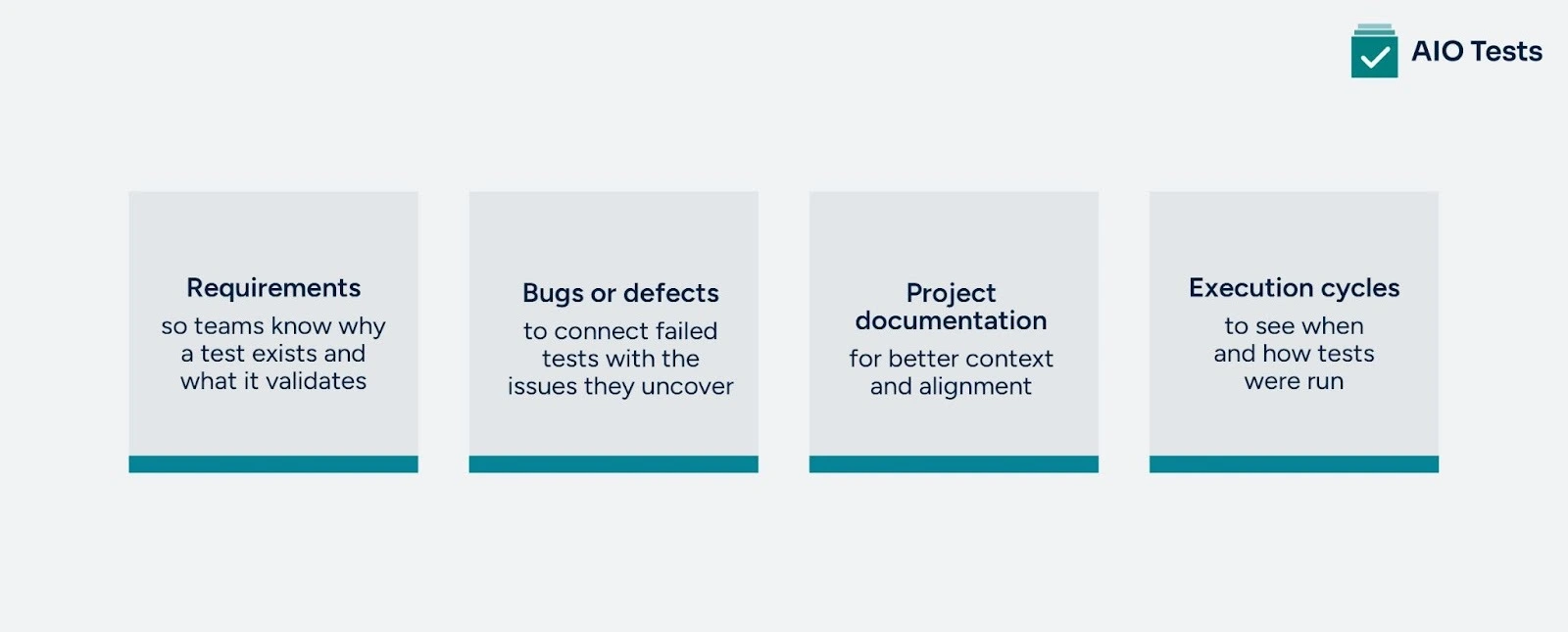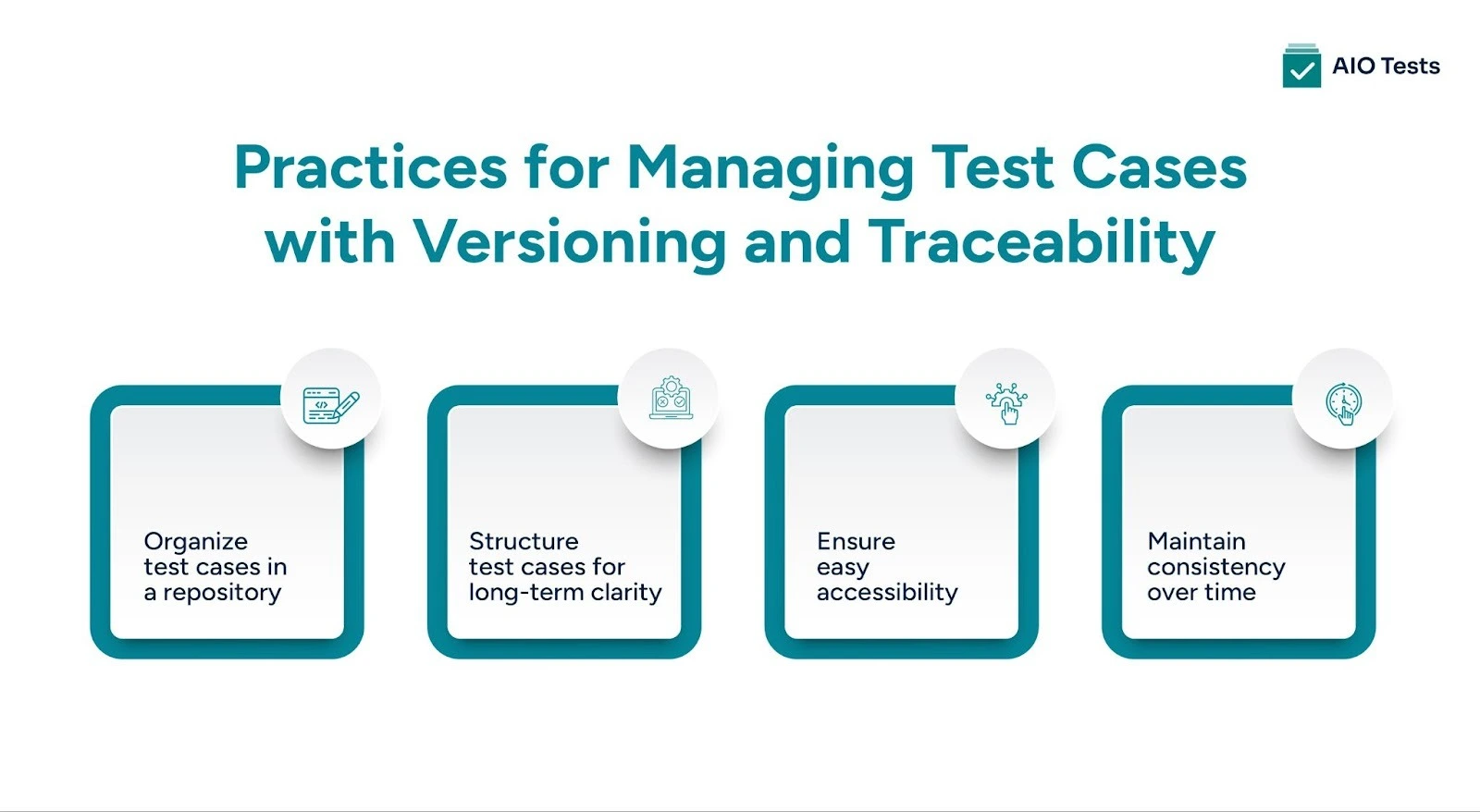Quick Summary
Effective <em>managing test cases</em> is essential for QA teams to maintain software quality and efficiency. Incorporating versioning ensures each test case is up-to-date, while traceability links tests directly to requirements and defects. Together, these practices enhance collaboration, reduce errors, and streamline QA workflows.
Effective test case management is crucial for QA teams to ensure software quality and efficiency.
However, teams face challenges when organizing, tracking, and maintaining test cases. Without proper structure, it's easy to lose track of changes, versions, and requirements, leading to confusion and errors.
Test case versioning and traceability help solve these problems by providing a clear record of changes over time and linking test cases directly to specific requirements or bugs. These practices not only improve accuracy but also enhance collaboration between team members.
Why Is Managing Test Cases Crucial for QA Teams?
Managing test cases is a fundamental part of any software quality assurance process. In simple terms, it’s the practice of organizing, documenting, and tracking test cases to ensure that software is thoroughly tested.
Proper test case management helps QA teams stay on top of test coverage, identify potential issues early, and maintain a clear record of testing activities. Test case management plays a significant role in QA for several reasons:
- A well-managed test case repository ensures that every test is consistent, reducing errors caused by repeated tests or missed steps.
- Clear documentation and traceability allow teams to work together more effectively, whether it’s developers, testers, or product managers.
- Tracking test cases helps teams monitor their progress, identify bottlenecks, and adjust as needed.
However, there are challenges in managing test cases, such as:
- Test case organization: Without a structured system, test cases can become disorganized, making it hard to find the right one when needed.
- Test case documentation: Inconsistent or incomplete documentation during the writing of test cases can lead to missed steps or unclear test purposes.
- Test case tracking: Without proper monitoring, it's easy to lose sight of which test cases have been executed or need updating.
By effectively managing test cases, teams can reduce errors, save time, and improve the overall efficiency of their QA process.
How Does Test Case Versioning Improve the Management of Test Cases in QA?
Test case versioning is the practice of keeping track of changes made to test cases over time. In QA, it ensures that teams always work with the most up-to-date version of a test case, preventing confusion and errors.
Versioning matters because it allows teams to:
- Track changes: Each time a test case is updated, the new version is recorded, so everyone knows what changed and why.
- Prevent confusion: Without versioning, different team members might unknowingly use outdated test cases, leading to inconsistencies and mistakes.
Versioning is particularly helpful in scenarios such as:
- Iterative development: As software evolves, test cases often need to be updated. Versioning keeps track of each change, ensuring that new test cases align with the latest development.
- Multiple release cycles: When software goes through multiple releases, versioning ensures that test cases are aligned with the specific version of the software being tested.
- Handling different environments: Test cases might need adjustments based on different testing environments. Versioning allows teams to maintain different versions for different environments.
By incorporating test case versioning, teams can ensure better organization and accuracy when managing test cases. This improves efficiency and reduces the risk of errors during the testing process.
What Is Test Case Traceability and Why Does It Matter in QA?
Test case traceability is the ability to track each test case back to its original requirement and forward through execution, defect reporting, and resolution. It ensures that every part of the testing process is connected, and performing a simple traceability analysis helps teams quickly identify gaps or misalignments.
Traceability ensures tests are clearly linked to what the software should do, how it should behave, and how issues are resolved. It’s especially valuable across different types of QA testing, helping teams ensure that functional, regression, smoke, and other test types are fully covered and properly documented.
Strong traceability links test cases to:

When traceability is in place, teams benefit from:
- Clearer communication across QA, dev, and product teams
- More complete test coverage and fewer missed scenarios
- Easier audits and documentation reviews
- Faster test case tracking and change management
Managing test cases without traceability often leads to gaps in coverage, duplicated efforts, or lost context. With it, QA becomes more precise, accountable, and aligned with real business goals.
How Do Versioning and Traceability Strengthen Collaboration in QA Test Case Management?
Collaboration breaks down quickly when teams aren't aligned. Test case versioning and traceability help prevent that. Together, they create a shared source of truth that keeps everyone on the same page, including developers, testers, product managers, and other stakeholders.
Versioning ensures that test case changes are documented and visible. Everyone knows which version is current and why it changed. Traceability connects each test case to its requirement, bug report, or release cycle. The result is full context with no guessing.
These practices help teams:
- Understand the why behind each test
- See how each change affects the test case
- Avoid working on outdated or duplicate tests
- Track test execution and outcomes with clarity
When managing test cases across teams, versioning and traceability reduce back-and-forth by providing clear records. This helps:
- Prevent miscommunication between QA and dev teams
- Cut down on rework caused by using the wrong version of a test
- Simplify handoffs across team roles and time zones
Without these practices, QA efforts can get messy fast. But with proper versioning and traceability in place, collaboration becomes more focused and efficient, especially for critical processes like regression testing.
What Are the Best Practices for Managing Test Cases with Versioning and Traceability in QA Workflows?

To get the most out of test case versioning and traceability, it’s important to follow best practices that keep your workflow organized and efficient. Here are some practical tips for managing test cases effectively:
- Organize test cases in a repository: Store all test cases in a central repository where they are easy to find and manage. Tools like AIO Tests can help keep everything organized and accessible. Make sure the repository is structured logically, with clear categories for different types of software testing (e.g., smoke tests, regression tests).
- Structure test cases for long-term clarity: Create clear, consistent naming conventions and documentation for each test case. This makes it easier for team members to understand the test’s purpose and requirements, even years down the line.
- Ensure easy accessibility: Test cases should be easily searchable and accessible to anyone who needs them. Use versioning to keep track of changes and ensure the most up-to-date version is available.
- Maintain consistency over time: Regularly review and update test cases to ensure they stay relevant. Versioning helps maintain this consistency by clearly documenting each change made over time.
QA testing tools that support test case repositories simplify these practices by enabling versioning, traceability, and easier collaboration. They help align teams, prevent miscommunication, and ensure everyone is working from the most accurate and up-to-date information.
By implementing these best practices, you can streamline your QA process, improve collaboration, and reduce errors in test case management.
How Can AIO Tests Improve Managing Test Cases in Jira?

AIO Tests is an AI-powered test case management tool for Jira that helps teams streamline test case management, versioning, and traceability. It integrates directly into Jira, making it easy to organize, track, and update test cases while maintaining a clear record of changes and test results.
Key features of AIO Tests include:
- Automated test case management: Simplify the creation, execution, and tracking of tests.
- Test case tracking: Keep an accurate record of test progress and outcomes.
- Clear documentation: Maintain detailed, organized test case documentation for easier review.
- Version history: Track test case evolution over time, ensuring teams always use the most up-to-date versions.
- Requirement-to-test mapping: Link each test case directly to its related requirement for full traceability.
- Centralized test case repository: Store all test cases in one location for easy access and organization.
For example:
A QA team using AIO Tests can quickly identify which version of a test case is tied to a specific requirement, view its change history, and ensure everyone is working from the most current version. This reduces confusion and improves efficiency across the team, allowing them to focus more on testing and less on managing test case details.

Conclusion
In modern QA teams, test case versioning and traceability are non-negotiable practices that ensure efficient, accurate, and aligned workflows. Versioning prevents confusion by tracking changes to test cases over time, while traceability guarantees complete visibility into each test case’s lifecycle from requirements to execution and defect resolution.
By integrating versioning and traceability, teams can eliminate manual chaos, ensure complete test coverage, and improve overall productivity. A centralized solution like AIO Tests simplifies test case management by providing automated tracking, clear documentation, and full version history, improving QA processes.
Book a demo with AIO Tests on Atlassian Marketplace today to see how it can simplify your test case management, cut down on manual work, and boost collaboration across your QA team.

FAQs
1. What is the meaning of test case management
Test case management is the structured way of creating, organizing, and executing all test cases used to validate software quality. It keeps the entire test suite consistent and traceable to requirements. Teams use it to avoid duplication, track coverage, and maintain a clean repository. Without it, QA turns into guesswork instead of a controlled process.
2. How do you manage test cases
You manage test cases by writing clear, actionable tests and organizing them by features or modules. Keep everything updated after each release so nothing becomes irrelevant. Track execution results and document failures so the team can respond fast. A dedicated test management tool keeps this entire workflow tight and scalable.
3. What is the best way to manage test cases in Jira
Jira on its own is not built for test case management, so the smart move is to use an add-on that fits your workflow. Tools like AIO Tests plug directly into your Jira issues, letting you create test cases, organize them into cycles, and track execution without jumping between platforms. This keeps your team aligned and eliminates the usual chaos of attachments and scattered comments.
4. What is the best test case management tool
There’s no single “best” tool, but a few stand out based on how teams work. AIO Tests is well-suited for teams that want everything managed in Jira without jumping between platforms. Xray, QMetry, and TestRail are also widely used because they offer clean organization, test execution tracking, and reporting.








.svg)
